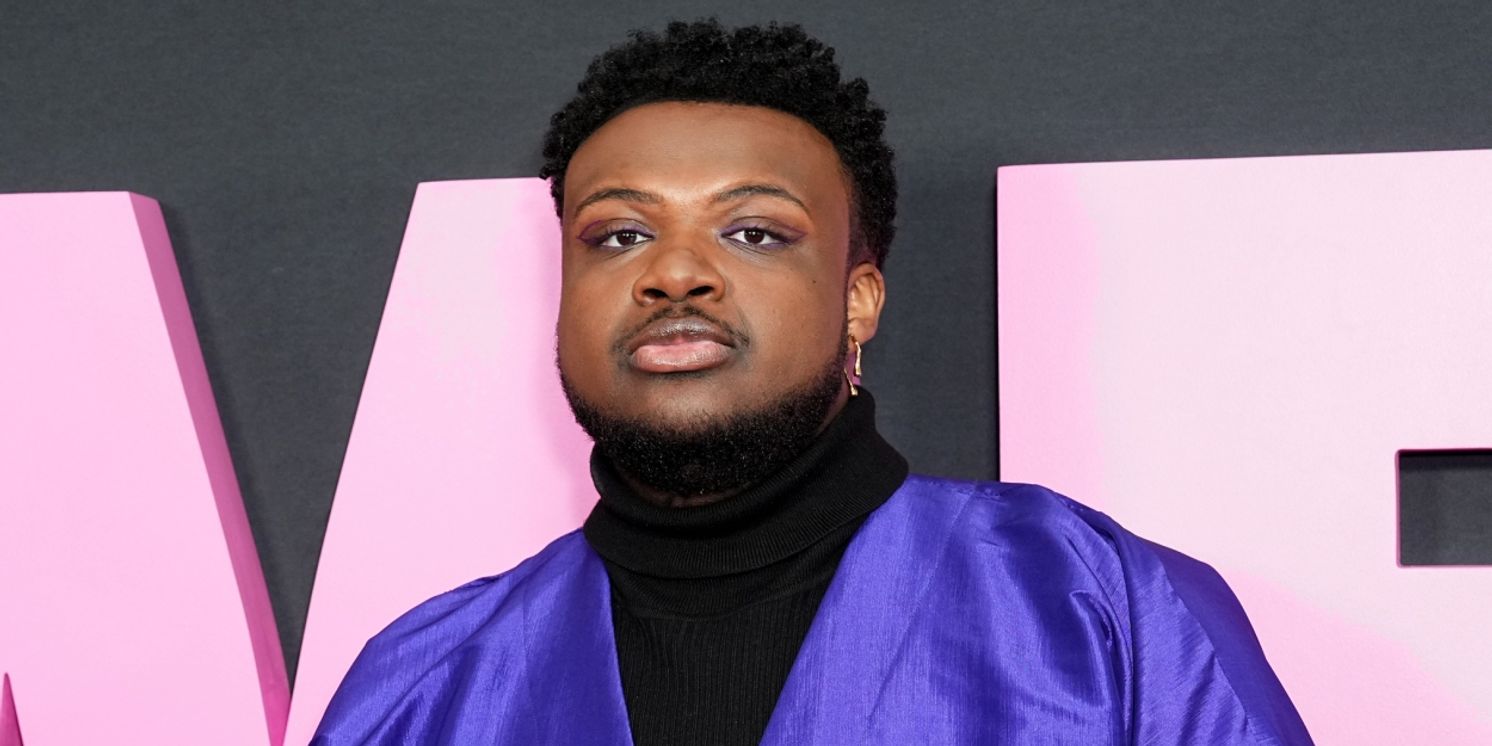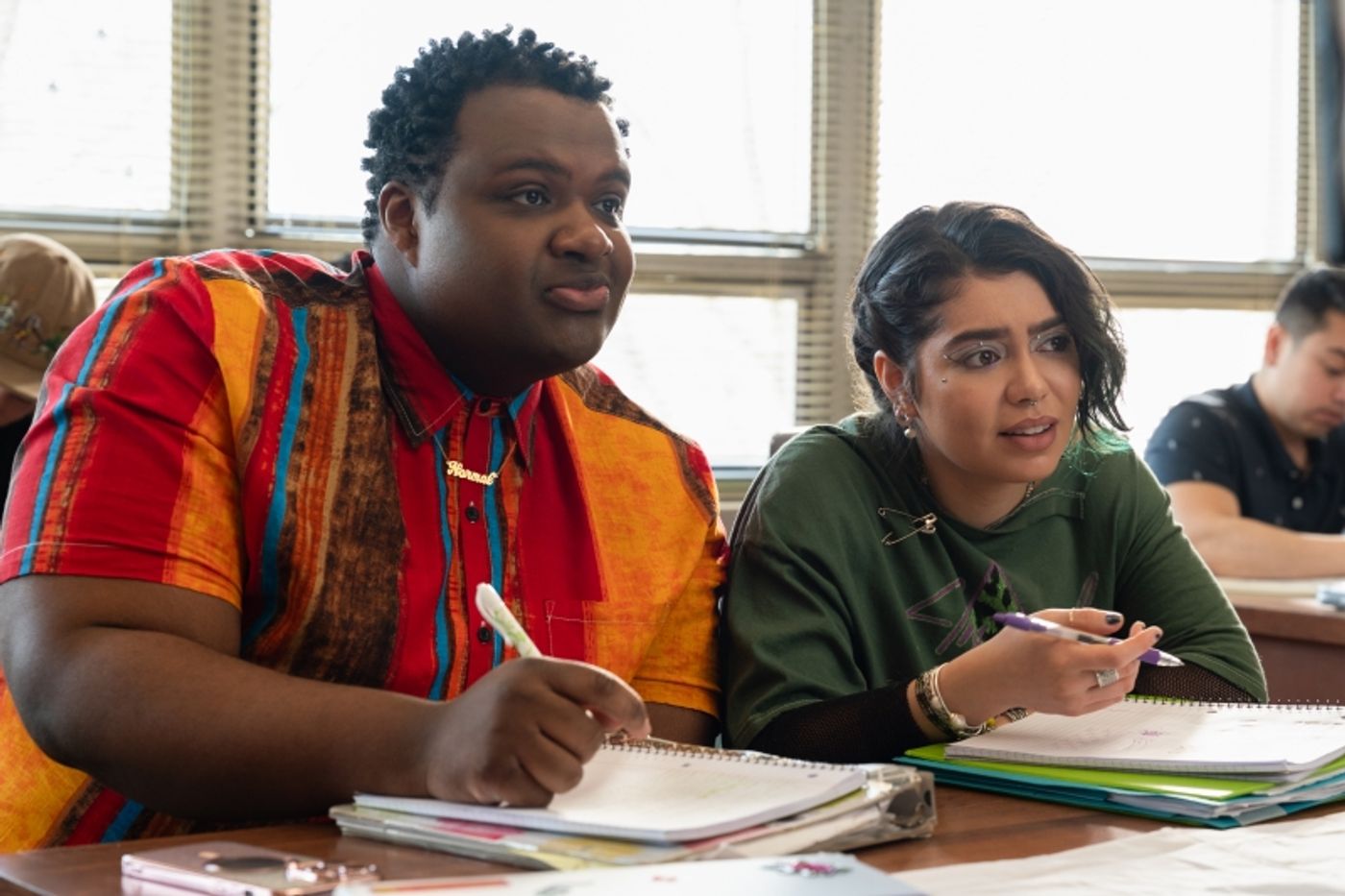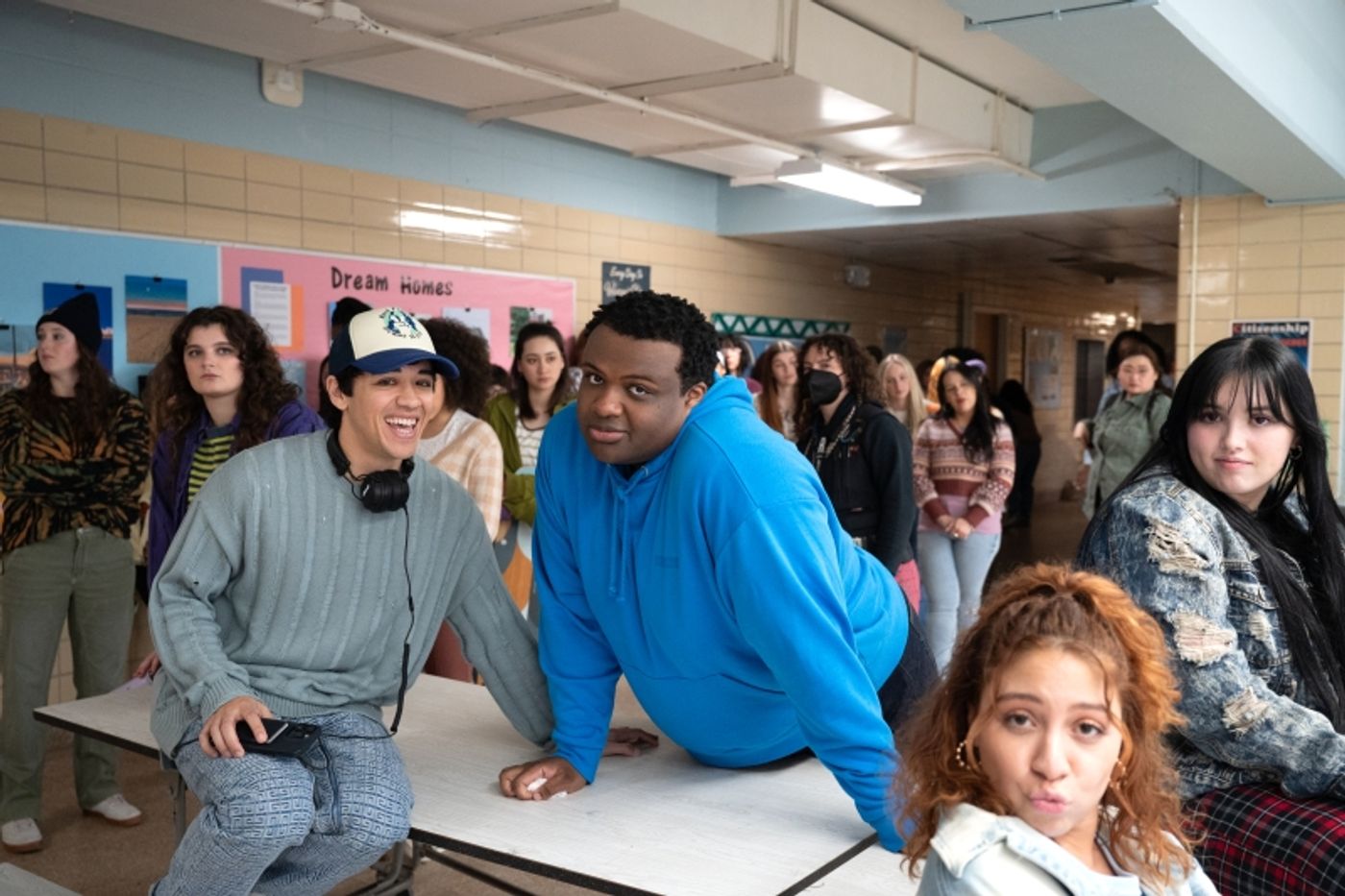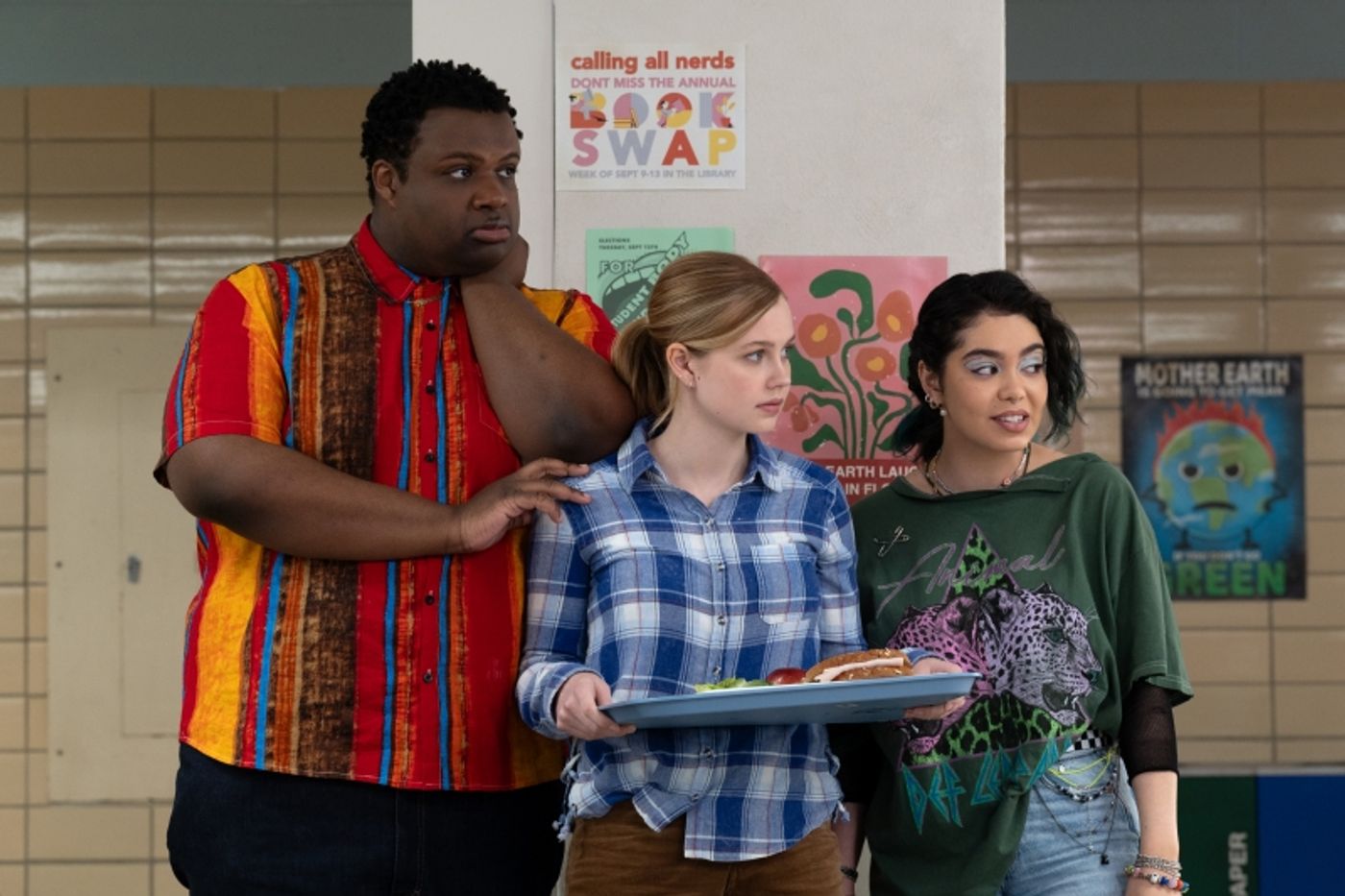Interview: How Jaquel Spivey Made Damian His Own in MEAN GIRLS
Mean Girls is out in theaters now.

One month after his Tony-nominated run in A Strange Loop on Broadway, Jaquel Spivey jumped into the shoes of Damian Hubbard in the Mean Girls movie musical.
Starting out in a recording studio and then filming the movie in a month at an old high school in New Jersey, Spivey creating his own version of Damian, fusing together the character's beloved essence with what makes him unique to the role.
Spivey's work is on display with Mean Girls now playing in theaters. He is joined in the film by Angourie Rice, Reneé Rapp, Auli’i Cravalho, Avantika, Bebe Wood, Christopher Briney, Jenna Fischer, Busy Philipps, Ashley Park, Tina Fey, and Tim Meadows.
BroadwayWorld caught up with Spivey to discuss taking the leap from stage to screen, what it was like filming the movie musical, and more.
Mean Girls is out now in theaters. How are you feeling about it?
You know what, I'm very proud. I'm very proud of what we did. I'm very proud the way we took on such an iconic piece and truly made it our own and that we stood strong in the fact that this wasn't a remake, but a re-imagining. I'm glad that we get to take the world of musical theater and put it on screen and give it more access.
I know you pretty much jumped right into this right after A Strange Loop. What was that leap going right into Mean Girls like that?
It was a jump that I was very excited and eager for. Mainly because, as we know, Broadway is hard. Broadway is difficult. But especially when you're doing a show that is rooted in someone's mind and it deals with pain and trauma and abuse and being misunderstood and not even understanding yourself fully. When you do that, eight shows a week, in my case, six shows a week, it gets on you a little bit. It weighs heavy on you, it weighs heavy on your voice, on your body, on your spirit, mainly. While it was a fantastic story to tell and I'm so honored that I was chosen to tell it with that phenomenal past, I needed some light and I needed some joy to lift me up and I needed something that would truly make me smile every day. I think that's what Mean Girls was.
So I jumped in, ready to go. I mean, yes, there was nerves and anxiety, but I think I was really ready for the challenge.

Since you are so early into your film career, did Mean Girls being a musical help with your transition from stage to screen?
Absolutely. Now, though Damian's two songs were cut, Damian still sang. I really was happy about that. But also I was happy about being able to sing slightly more in my voice. The character of Damian is 17, so his voice is altered from what Jaquel sounds like. But Usher was really leaps and bounds away from my tone and my vocal structure because it was, at request of the music team, that I really dug into what his voice should sound like. So I think that's something else that kind of would make it a little more difficult.
So getting the opportunity to go in the studio and be told, "Yes, we need to find the character in here, but also we would love to hear what your voice sounds like," was really encouraging.
It's interesting to hear how this Damian is more similar to you. How did you make the character your own in that sense? How did you kind of go about discovering him?
For me, discovering him started with realizing all the things that separate Jaquel from anyone else who has played Damian. That is me being a black man. That's me being a person who was in high school in the era of body positivity and inclusivity and "bullying is bad" and "we need to stop this" and also social media. There are a lot of things that happened in 2004 when I was five that I can't relate to or understand so I can only bring the knowledge of somebody who graduated high school in 2017. So that's gonna make him walk different. He's gonna move through the world different. His presence in a room is going to just be different.
I think his essence to me is what I wanted to stay the same because the audience fell in love with him for a reason. To remove that reason for the sake of being like, "No, I'm doing my own thing," it could work, but then you wouldn't know who Damian is. I still wanted him to be that familiar gay best friend you had in 2004, but I wanted you to see him in a new life, a new body, from a new perspective.

The musical numbers are so seamless in this movie. I love how they're integrated into the film. I'd love for you to like maybe take us behind filming them. What was it like getting to do musical numbers for a camera?
Well, first off, I have to be corny and shout out Samantha Jane and Arturo Perez Jr., the directors and Kyle Hanagami [the choreographer]. When I tell you the way that they made sure that we were a well oiled machine by the time we got in front of the camera, we rehearsed, we rehearsed inside, we rehearsed outside. There were times when it might've been a little drizzle. There were times it may have been five degrees. But it was really a passion project for the most part.
A lot of us started off as fans of this movie. So like to jump into it, our goal was like, "Okay, now we add some music and some dance numbers. Those have to pop just as much as anything else, if not more than anything else. Because that's the reason for us making this movie." If it was a remake, I would not have signed up. I don't think anybody else would have. The re-imagining is through the fact that it's a musical. And I think that's the most important part that we sometimes are leaving out.
I keep encouraging people to understand that it is a musical despite what is being shown. Because that to me is where we worked our asses off. We started off in the vocal studio, our recording studio. That's where I started. The first thing I did was start recording music. Then we got to read the script through with Tina [Fey], get different drafts from her. Then we started rehearsing choreo with Kyle, rehearsing with our directors and then just putting them all together.
The structure of it really did feel like, I've never done theater camp – just saw the movie recently, very good – but to me, it felt like what theater camp would have felt like had I gone. You're in a hotel or an Airbnb with these people, and then you come together at like 8 a.m. and start rehearsal. Then by the end of the day, you're running it. Then in a few weeks or in a couple of days, you're actually in costume and hair doing the thing. It was really exciting to put those numbers, those musical numbers, to bring them to life. That was what I was most excited for joining this project.
Since you mentioned this was like theatre camp, what were your days on set like? This seems like such a fun cast to be a part of.
Absolutely. Well, I will say, a part of that fun and the theater camp vibe was encouraged by Tina and our directors. Like, if you all are not having fun together, it will not translate. You have to have a good time. Like yes, this is work and the work comes first. But you do have to enjoy each other's company. So for us, all of us, one night we went to town and we found an arcade that had all these games. And after 10 o'clock you could bring it out alcohol if you're over 21. We were sitting there playing Guitar Hero and Garage Band for like four hours, just really like getting to know each other. Going to a restaurant and getting something to eat or going out for a drink. Then just watching the Oscars together, you know, having a little viewing party.
The fun and excitement you saw on that screen wasn't fake. I'm so proud that I get to say that, that I can truly say I made great relationships with people in this cast. And unlike Broadway, you know, you're with these people all day, every day, eight shows a week, so you have no choice but to find a common ground. And in the world of film, I'm learning that there are times you may not see somebody for two weeks and you still have to take initiatives and say, "Hey, I know we won't be filming together, would you like to come over and like, you know, play Uno? Or you wanna watch Dance Mom reruns or you know, reality TV?" It was really nice to work with generous actors.

Moving forward, I'm so excited for what's ahead of you in your career. When you're looking for a future project, what do you have in mind? Is it more film work? Is it more Broadway?
Well, I will never stop loving Broadway. I will never stop being a person who loves the theater, loves a lot of interaction with audiences. But I will say it is getting very disappointing as someone who was on Broadway and saw how difficult it was to be in a show and people like me who I wanted to represent couldn't afford to come and see it. So while I love Broadway, if it's gonna continue to be inaccessible, it won't continue to be successful. If film and television allows me to reach somebody who needs to be reached then that's what I'll do.
If we can find a way to get Broadway to more than just rich folks, then I am more than happy to come back. If we can tell more original stories, then I am more than happy to do the work. I don't want to build my career performing for people who won't necessarily be the most inspired or changed.
James Monroe Iglehart in Memphis changed me and I was able to see it because Memphis at one point was on Netflix, you know what I mean? Ken Page in Ain't Misbehavin' changed me because they filmed Ain't Misbehavin' for a television special and that was on YouTube. So that access was how it reached a little boy in North Carolina. I would love it if Broadway could be the same thing, but if film and television gives me those opportunities, I'm gonna take those as well.
Watch the trailer for Mean Girls here:
Photos: Jojo Whilden/Paramount © 2023 Paramount Pictures.
Videos

